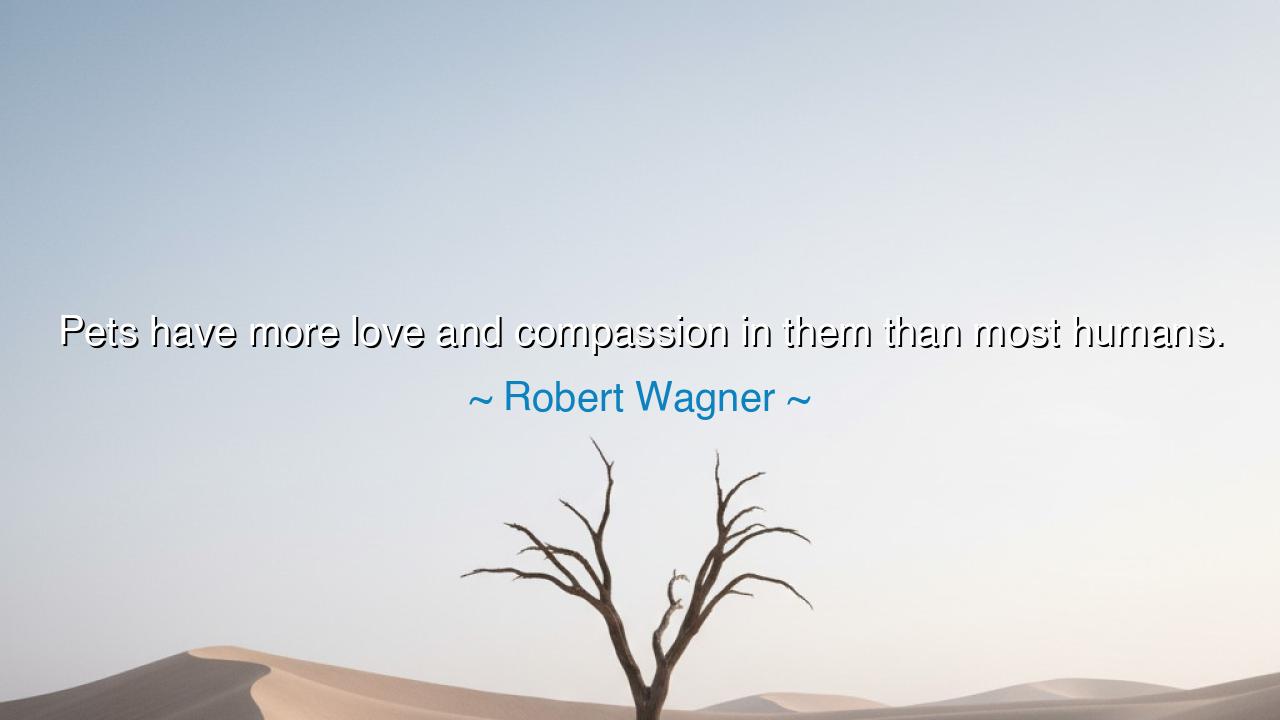
Pets have more love and compassion in them than most humans.






Robert Wagner, with words both tender and piercing, once declared: “Pets have more love and compassion in them than most humans.” At first, this may strike the heart with both wonder and sorrow—wonder at the purity of our animal companions, and sorrow that humankind, with its vast wisdom and reason, so often falls short of the very virtues that beasts embody naturally. In this statement lies not only admiration for animals, but a rebuke to human pride, a reminder that greatness is not measured by intellect alone, but by the depth of love and the reach of compassion.
The origin of this thought springs from Wagner’s reflections on the role of pets in human lives. He was a man who knew fame, applause, and the fickleness of people, and yet, like many, found in animals a constancy that far exceeded the loyalty of men. The dog, the cat, the humble creatures that live at our side—they ask for little beyond food and shelter, yet they give without measure. They heal loneliness with presence, and soothe sorrow with their quiet companionship. They do not calculate their affections, nor weigh their loyalties against advantage. In this, Wagner saw a truth: animals love more simply, and often more truly, than humans.
To say that pets have more compassion is to recognize their uncanny ability to sense suffering. Who has not seen a dog curl itself against a grieving master, or a cat press gently against a sick child, as though carrying part of their burden? Such acts are not reasoned, nor strategic, but spring from the well of instinctive love. Humans, with their words and cleverness, too often hesitate—asking whether kindness is deserved, calculating cost before extending care. But the animal acts without hesitation, proving that compassion uncalculated is compassion in its purest form.
History offers many shining examples of this truth. During the First World War, a dog named Stubby became a companion to American soldiers, warning them of gas attacks, finding the wounded, and even capturing a German spy. Though but a beast, he showed a love for his companions greater than many men showed one another. His loyalty did not waver; his courage did not falter. In his devotion, we see what Wagner declared: that the love and compassion of pets can surpass the deeds of men.
And in quieter stories too, this truth resounds. Countless tales tell of pets waiting at doors long after their masters have passed, of animals refusing food until their loved ones return, of creatures whose faithfulness endures beyond death itself. Such devotion is rare among men, for human hearts are often clouded by pride, selfishness, and betrayal. The animal heart, in its simplicity, becomes a mirror of what humanity could be if it shed its vanity and embraced love without condition.
The lesson is clear: let us not scorn the example of animals, but learn from it. If the dog can love without judgment, so can we. If the cat can comfort without hesitation, so can we. If creatures without speech or reason can embody love and compassion so perfectly, then surely humanity—with all its wisdom—must strive to do no less. The greatness of man is not in surpassing the animal in power, but in matching it in kindness.
Practically, this means cultivating unconditional love in our daily lives. Do not measure affection by what others can give you in return. Offer compassion without delay when you see need. Let your presence be a comfort to those who suffer, even when words fail. And above all, remain faithful—through hardship, through silence, through trial—as the pet remains faithful to its master. In this way, the virtues of animals become the virtues of humankind.
So let Wagner’s words echo in your heart: “Pets have more love and compassion in them than most humans.” Take them not as condemnation, but as invitation. Let the faithfulness of your dog, the tenderness of your cat, the loyalty of your animal companion, remind you of the path you, too, are called to walk. For if animals, with their limited years, can leave such an enduring legacy of love, how much greater must be the legacy of love we leave, if we choose to follow their example.






AAdministratorAdministrator
Welcome, honored guests. Please leave a comment, we will respond soon